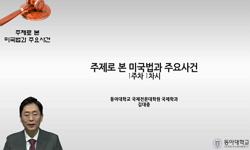The principle of nulla poena sine lege requires the elements of a crime and its punishment be determined in the form of a legislative act. The principle of nulla poena sine lege requires the elements of a crime and its punishment be determined in the ...
http://chineseinput.net/에서 pinyin(병음)방식으로 중국어를 변환할 수 있습니다.
변환된 중국어를 복사하여 사용하시면 됩니다.
- 中文 을 입력하시려면 zhongwen을 입력하시고 space를누르시면됩니다.
- 北京 을 입력하시려면 beijing을 입력하시고 space를 누르시면 됩니다.
부가정보
다국어 초록 (Multilingual Abstract)
The delegation of punitive law is not desirable in light of the principle of nulla poena sine lege, that of due process, and the constitutional ideology of the precedence of basic rights, and therefore the prerequisites to and the scope of such delegation shall be applied there more strictly. Delegation of punitive laws should be limited only to exceptional situations where there is urgent need for such delegation or the circumstances that do not allow detailed definitions in statutes. Even when so delegated, the statutes must define concretely the elements of the crimes so that the punished conduct can be predicted, and state clearly the types, limit and scope of punishment.
The Constitutional Court has set this strict review standard for the delegation of punitive law, however it's difficult to predict the result of the application of this standard. The meaning and importance of this legality principle doesn't decrease under the tendency of the subordination to the Executive, the steep increase of the delegation in welfare state. Therefore, the Court should review the urgent need of the delegation of punitive law strictly. The Court maybe consider the element of expertise and flexibility first and if it is satisfied, at next review step, the examination that delegate law would guide how and what punitive regulation will be prescribed, the resonable test should be applied. This standard would make for the realization of the modern principle of ‘nulla poena sine lege.’
The principle of nulla poena sine lege requires the elements of a crime and its punishment be determined in the form of a legislative act. The principle of nulla poena sine lege requires the elements of a crime and its punishment be determined in the form of a legislative act. The Article 12 (1) of Constitution provides "No person may be arrested, detained, searched, seized, or interrogated except as provided by law". Also, the Article 75 of Constitution provides "the President may issue presidential decrees concerning matters delegated to him by law with the scope specifically defined and also matters necessary to enforce laws". The Constitution authorizes lower level regulations only for those matters delegated to such regulation in statute with concretely defined scope.
The delegation of punitive law is not desirable in light of the principle of nulla poena sine lege, that of due process, and the constitutional ideology of the precedence of basic rights, and therefore the prerequisites to and the scope of such delegation shall be applied there more strictly. Delegation of punitive laws should be limited only to exceptional situations where there is urgent need for such delegation or the circumstances that do not allow detailed definitions in statutes. Even when so delegated, the statutes must define concretely the elements of the crimes so that the punished conduct can be predicted, and state clearly the types, limit and scope of punishment.
The Constitutional Court has set this strict review standard for the delegation of punitive law, however it's difficult to predict the result of the application of this standard. The meaning and importance of this legality principle doesn't decrease under the tendency of the subordination to the Executive, the steep increase of the delegation in welfare state. Therefore, the Court should review the urgent need of the delegation of punitive law strictly. The Court maybe consider the element of expertise and flexibility first and if it is satisfied, at next review step, the examination that delegate law would guide how and what punitive regulation will be prescribed, the resonable test should be applied. This standard would make for the realization of the modern principle of ‘nulla poena sine lege.’
국문 초록 (Abstract)
그러나 실제 처벌법규 위임입법의 위헌성여부를 심사해온 헌법재판소 결정례를 상세히 살펴보면, 처벌법규의 위헌성 심사기준설정과 적용이 모호하고 일관성을 찾기가 어려우며 경우에 따라서는 일반 위임입법의 위헌성 심사와도 큰 차이를 보이고 있지 않다. 이에 본 논문은 헌법상 죄형법정주의원칙, 그 중에서도 죄형법률주의 원칙이 갖는 의미와 위임입법원칙과의 관계를 검토하고 지금까지 처벌법규 위임입법에 대한 헌법재판소의 결정례에 대한 심도 있는 분석을 통해 처벌법규 위임입법에 대한 심사기준에 대해 재고찰해 보는 기회를 갖고자 한다.
헌법 제12조 제1항은 "누구든지......법률과 적법한 절차에 의하지 아니하고는 처벌, 보안처분 또는 강제노역을 받지 아니 한다"고 하여 죄형법정주의를 규정하고 있고 제75조 및 제95조는 '구...
헌법 제12조 제1항은 "누구든지......법률과 적법한 절차에 의하지 아니하고는 처벌, 보안처분 또는 강제노역을 받지 아니 한다"고 하여 죄형법정주의를 규정하고 있고 제75조 및 제95조는 '구체적 범위를 정한' 위임입법을 허용하고 있다. 제75조는 위임입법이 완전히 금지되는 특정 영역을 별도로 규정하고 있지 않기 때문에 위임입법의 근거규정은 죄형법정주의원칙의 적용을 받는 범죄의 구성요건이나 내용에 대한 입법, 즉 처벌법규에도 적용이 되는 것인지가 문제된다. 이에 헌법재판소는 죄형법정주의 원칙에 대해서도 위임입법의 근거와 한계에 관한 헌법 규정인 제75조 및 제95조는 적용된다고 보면서 다만 법률에 의한 처벌법규의 위임은 그 요건과 범위가 일반 위임입법보다 엄격하게 제한적으로 적용되어야 한다고 설시하였다. 이에 따라 형벌법규를 위임하기 위해서는 특히 긴급한 필요가 있거나 미리 법률로써 자세히 정할 수 없는 부득이한 사정이 있는 경우에 한정되어야 하며, 이러한 경우에도 범죄의 구성요건은 처벌대상행위가 어떠한 것이라고 예측할 수 있을 정도로 법률에서 구체적으로 규정하여야 하되, 위임입법의 위와 같은 예측가능성의 유무를 판단함에 있어서는 당해 특정 조항 하나만을 가지고 판단할 것이 아니고 관련 법조항 전체를 유기적ㆍ체계적으로 종합하여 판단하여야 한다고 설시하고 있다.
그러나 실제 처벌법규 위임입법의 위헌성여부를 심사해온 헌법재판소 결정례를 상세히 살펴보면, 처벌법규의 위헌성 심사기준설정과 적용이 모호하고 일관성을 찾기가 어려우며 경우에 따라서는 일반 위임입법의 위헌성 심사와도 큰 차이를 보이고 있지 않다. 이에 본 논문은 헌법상 죄형법정주의원칙, 그 중에서도 죄형법률주의 원칙이 갖는 의미와 위임입법원칙과의 관계를 검토하고 지금까지 처벌법규 위임입법에 대한 헌법재판소의 결정례에 대한 심도 있는 분석을 통해 처벌법규 위임입법에 대한 심사기준에 대해 재고찰해 보는 기회를 갖고자 한다.
참고문헌 (Reference)
1 권영성, "헌법학원론" 법문사 2008
2 정종섭, "헌법학원론" 박영사 2008
3 김철수, "헌법학개론" 박영사 2007
4 성낙인, "헌법학" 법문사 2008
5 "헌법재판소 판례집"
6 허영, "헌법이론과 헌법" 박영사 2006
7 김영옥, "죄형법정주의의 연혁과 사상적 배경" 7 : 2000
8 홍영기, "죄형법정주의의 근본적 의미" (25) : 2005
9 이명웅, "죄형법정주의와 명확성이론" 6 :
10 이기헌, "죄형법정주의에 관한 판례 고찰" 9 : 1994
1 권영성, "헌법학원론" 법문사 2008
2 정종섭, "헌법학원론" 박영사 2008
3 김철수, "헌법학개론" 박영사 2007
4 성낙인, "헌법학" 법문사 2008
5 "헌법재판소 판례집"
6 허영, "헌법이론과 헌법" 박영사 2006
7 김영옥, "죄형법정주의의 연혁과 사상적 배경" 7 : 2000
8 홍영기, "죄형법정주의의 근본적 의미" (25) : 2005
9 이명웅, "죄형법정주의와 명확성이론" 6 :
10 이기헌, "죄형법정주의에 관한 판례 고찰" 9 : 1994
11 김학태, "죄형법정주의에 관한 고찰" 7 : 1999
12 임중호, "입법과정의 개선 및 발전방향, 입법과정의 현황과 개선방안" 한국공법학회 2005
13 김춘환, "위임입법의 한계와 통제, 입법과정의 현황과 개선방안" 한국공법학회 2005
14 김철용, "위임입법의 한계에 관한 연구" 헌법재판소 1996
15 이명웅, "위임입법의 위헌심사기준 및 위헌결정사례 분석" 2007
16 박영도, "위임입법에 관한 연구" 법제연구원 1999
17 Joshua Dressler, "Understanding Criminal Law" Newark 2001
18 Margaret H. Lemos, "The Other Delegation; Judicially Administered Statues and the Nondelegation Doctrine" 2008
19 Louis D. Bilionis, "Process, the Constitution, and Substantive Criminal Law" 1998
20 John Calvin Jeffries, "Legality, Vagueness, and the Construction of Penal Statutes" 1985
21 Mch/Kunig, "Grundgesetz-Kommentar" Aufl 2003
22 "Chemerinsky, Constitutional Law, Principles and Policies"
동일학술지(권/호) 다른 논문
-
- 세계헌법학회 한국학회
- 조병윤
- 2008
- KCI등재
-
An Originalist Test for Korea that Progressive should not Fear
- 세계헌법학회 한국학회
- ( Sean C. Hayes )
- 2008
- KCI등재
-
- 세계헌법학회 한국학회
- 오동석
- 2008
- KCI등재
-
- 세계헌법학회 한국학회
- 황창근
- 2008
- KCI등재
분석정보
인용정보 인용지수 설명보기
학술지 이력
| 연월일 | 이력구분 | 이력상세 | 등재구분 |
|---|---|---|---|
| 2027 | 평가예정 | 재인증평가 신청대상 (재인증) | |
| 2021-01-01 | 평가 | 등재학술지 유지 (재인증) |  |
| 2018-01-01 | 평가 | 등재학술지 유지 (등재유지) |  |
| 2015-01-01 | 평가 | 등재학술지 유지 (등재유지) |  |
| 2011-05-03 | 학회명변경 | 한글명 : 국제헌법학회한국학회 -> 세계헌법학회한국학회영문명 : Korean Branch Of International Association Of Constitutioanl Law -> Korean Association of International Association of Constitutional Law |  |
| 2011-01-01 | 평가 | 등재 1차 FAIL (등재유지) |  |
| 2009-01-01 | 평가 | 등재학술지 유지 (등재유지) |  |
| 2006-01-01 | 평가 | 등재학술지 선정 (등재후보2차) |  |
| 2005-05-25 | 학술지명변경 | 외국어명 : 미등록 -> World Constitutional Law Review |  |
| 2005-01-01 | 평가 | 등재후보 1차 PASS (등재후보1차) |  |
| 2003-07-01 | 평가 | 등재후보학술지 선정 (신규평가) |  |
학술지 인용정보
| 기준연도 | WOS-KCI 통합IF(2년) | KCIF(2년) | KCIF(3년) |
|---|---|---|---|
| 2016 | 1.6 | 1.6 | 1.2 |
| KCIF(4년) | KCIF(5년) | 중심성지수(3년) | 즉시성지수 |
| 1.15 | 1.11 | 1.468 | 0.24 |




 KCI
KCI







